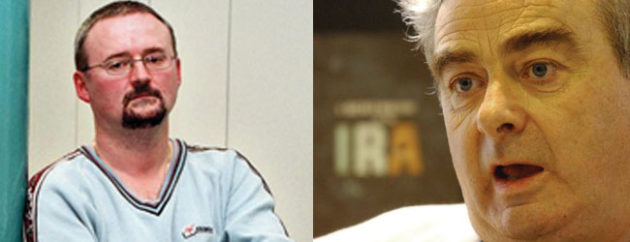
Gli sforzi del governo britannico di ottenere i nastri delle interviste degli ex membri dell’IRA concesse al Boston College dieci anni fa, hanno subito un’accelerata.
Un giudice federale ha respinto le mozioni dell’università americana e dei ricercatori coinvolti nel progetto.
Tra le interviste ricercate c’è quella all’ex prigioniera repubblicana Dolours Price che, secondo un quotidiano, avrebbe implicato Gerry Adams nella sparizione della madre di 10 figli Jean McConville, avvenuta a Belfast nel 1972.
Il giudice distrettuale William Young ha deciso che l’università non dovrà consegnare i nastri alle università statunitensi.
Infatti ha stabilito che l’università dovrà consegnare elle sue mani, entro il 21 dicembre, tutti i materiali archiviati, affinché possa analizzarli prima di emettere il verdetto finale.
In aggiunta, il giudice Young ha detto che la data del 21 dicembre permette al Boston College di “presentare una richiesta alla Corte di Appello”, aprendo alla possibilità che il contenzioso legale possa continuare per ancora molte settimane.
Esprimendo il proprio disappunto per la decisione del giudice in un articolo online, il giornalista irlandese Ed Moloney, il supervisore del progetto, ha detto che lui ed i suoi colleghi ricercatori attendono “con fiducia l’accoglimento dell’invito del giudice all’università di presentare un appello”. L’archivio di storia orale del Boston College, ufficialmente denominato Progetto Belfast, include dozzine di interviste con paramilitari lealisti e repubblicani.
Le interviste ai repubblicani furono condotte dall’ex prigioniero dell’IRA e giornalista Anthony McIntyre.
Secondo Moloney, McIntyre ed il Boston College, gli intervistati hanno raccontato le loro storie dopo aver ricevuto l’assicurazione che sarebbero state pubblicate solo dopo la loro morte.
Ad oggi solo due interviste – con l’ex membro IRA Brendan Hughes e con l’ex membro UVF David Ervine – sono state pubblicate.
Le interviste hanno formato l’ossatura del libro di Ed Moloney, pubblicato nel 2010, Voices From The Grave.
Entrambi gli uomini sono deceduti.
La disputa sui nestri è iniziata lo scorso maggio, quando il Dipartimento di Giustizia americano, agendo per conto del governo britannico, chiese i nastri all’università. Quando il caso finì sui mezzi di comunicazione, venne riportato che tutti i nastri – sia lealisti che repubblicani – sarebbero stati analizzati.
In seguito emerse che solo i nastri riguardanti 26 membri dell’IRA venivano cercati, e più specificamente quelli riguardanti il sequestro e l’omicidio di Jean McConville.
La donna era uno dei Disappeared (gli Scomparsi, Ndt) ed il suo corpo venne recuperato sepolto alla spiaggia di Shelling Hill, nella Contea di Louth, nel 2003.
Il fatto che nessun nastro dei paramilitari lealisti venisse richiesto, aggiunto al fatto che anche Hughes avesse parlato dell’autorizzazione di Gerry Adams all’omicidio McConville, ha portato critiche perché il caso veniva interpretato come motivato politicamente e destinato solo a mettere in impaccio il presidente dello Sinn Fein.
Boost for British bid to obtain IRA tapes from US university
British Government efforts to obtain taped interviews that former IRA members gave to an American university a decade ago have been given a major boost.
A US federal judge has rejected motions by Boston College and its researchers to dismiss the case.
Among the interviews sought is one given by former IRA prisoner Dolours Price, who, according to a newspaper, has implicated Gerry Adams in the 1972 killing of mother-of-10 Jean McConville.
However, US District Court Judge William G Young stopped short of ordering the university to surrender the tapes to US authorities.
Instead, he directed the college to present to him all its archived material by December 21, so he can review it ‘in camera’ before rendering his final verdict.
In addition, Judge Young said the December 21 date will give the college time to “request a stay from the Court of Appeals”, thus opening the possibility that the already protracted legal battle may continue for many more weeks yet.
Expressing his disappointment at the ruling in a blog post, Irish journalist Ed Moloney, the overseer of the project, said that he and his fellow researchers “confidently expect the college to take up Judge Young’s implied invitation to lodge an appeal”. Boston College’s oral history archive, officially titled the Belfast Project, involved interviews with dozens of republican and loyalist paramilitaries.
Republican interviews were conducted by former IRA prisoner and independent journalist Anthony McIntyre.
According to Moloney, McIntyre and Boston College, interviewees told their stories after being assured that those interviews would only be published after they’d died.
To date only two interviews — former IRA man Brendan Hughes and former UVF member David Ervine — have been published.
They formed the basis of the Moloney-edited book Voices From The Grave, which was published in 2010.
Both men are now deceased.
The stand-off over the tapes began last May when the US Justice Department, acting on behalf of the British Government, subpoenaed tapes from the college. When the case initially hit the headlines, it was reported that all of the tapes — loyalist as well as republican — were being sought.
It later emerged that only the tapes involving some 26 IRA members were at issue, and more specifically the tapes with information about Mrs McConville’s slaying.
She was numbered among the Disappeared and her body was eventually discovered at Shelling Hill beach in Co Louth in 2003.
The fact that no loyalist tapes were requested, coupled with the fact that Hughes also claimed that Adams authorised Mrs McConville’s murder, has led critics of the case to claim that it is politically-motivated and is aimed only at embarrassing the Sinn Fein president.